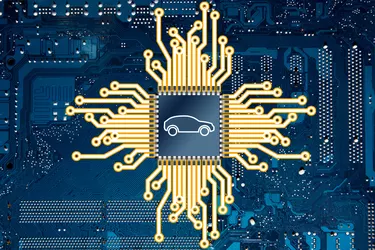
Computer chips power almost everything we do, from cleaning the house to driving to work. One of the many ways the pandemic has impacted the consumer market has been with the microchip shortage. Chances are, this shortage will affect your wallet if you buy cars, electronics or appliances this year.
What Is the Microchip Shortage?
Video of the Day
Many consumers may have dismissed the microchip shortage, assuming it wasn't going to affect them if they weren't in the market for a computer. But microchips are used in a wider range of products than many consumers realize, including:
Video of the Day
- computers
- gaming consoles
- toys
- smartphones and tablets
- TVs
- automobiles
- household appliances
To understand the shortage, it's important to understand that most of the global computer chip supply comes from Taiwan. The COVID-19 pandemic has particularly impacted Asia, which has led to multiple factory shutdowns. With so much of the world relying on these microchips now, even a brief shutdown can disrupt the supply chain for years.
Consider also: What Appliances in the Kitchen Are Best for My Home Value?
How the Shortage Affects You
If you don't plan to buy products that use semiconductors in the next year or two, the shortage may have no effect on you. But if you're buying a product that uses one of these chips, you could be affected in a couple of ways. The biggest impact is to your wallet, as the cost of any electronics or appliances you buy will likely be higher than ever.
When manufacturers have to pay more for their components, they charge more for their electronics and appliances, which is a cost that is eventually passed on to you, the consumer.
But as China's manufacturing sector struggles to catch up, you'll see another impact. If your microwave or clothes dryer breaks, you may find that there's a wait to get a replacement. Some consumers are reporting appliance wait times of three months or more.
Consider also: What Impact Is Omicron Having on the Economy?
Price Increases Due to Shortage
When demand exceeds supply, rising prices are an inevitable byproduct. The Taiwan Semiconductor Manufacturing Co., one of the largest semiconductor producers, recently announced an upcoming chip price increase of about 20 percent, which will be TSMC's largest single increase ever. This is in addition to a 10 percent increase earlier this year.
When manufacturers have to pay more for their components, they charge more for their electronics and appliances, which is a cost that is eventually passed on to you, the consumer. Interestingly, the smaller inventory in new appliances, electronics and cars has driven demand to the used market. If you try to buy a used car or household item, you may find that you're paying much more than you would have a couple of years ago.
Future of the Chip Supply
It would be nice to think that the chip supply would just magically disappear at the end of 2021 or even 2022. Unfortunately, experts have predicted the chip shortage might extend all the way to 2023, especially since each month brings more gadgets, cars and appliances that use microchips. Rising demand plus a limited supply equals a long-term problem.
In the meantime, technology companies are looking for workarounds. Intel, Apple and AMD are all adjusting their supply chains. They're also looking into building more semiconductor production facilities, but that would take some time.
What You Can Do
The truth is, the best thing you can do as a consumer is simply to wait to buy products that have built-in microchips. If you can put off buying a car, appliance or electronics item for a couple of years, you might save money.
What if you can't wait, though? That's where buying used can come in. Shop around and consider buying from a private seller rather than a dealer if you're buying a car. Make sure you have the car inspected by a professional mechanic and check vehicle history before buying.
Consider also: Should You Wait to Buy a Car?
Although the microchip shortage has become an inconvenience, you can minimize its impact on your budget. If you can wait to buy a new car, or to buy electronics or appliances, the issue should resolve itself in a year or two. But if not, be sure to shop around and be open to buying used.
- Consumer Reports: Global Chip Shortage Makes It Tough to Buy Certain Cars
- New Scientist: There’s a Global Shortage of Computer Chips – What’s Causing It?
- Consumer Reports: How to Shop for a Large Appliance Now
- NIKKEI Asia: TSMC Hikes Chip Prices up to 20 Percent Amid Supply Shortage
- Ars Technica: Apple, AMD, and Intel Shift Priorities as Chip Shortages Continue